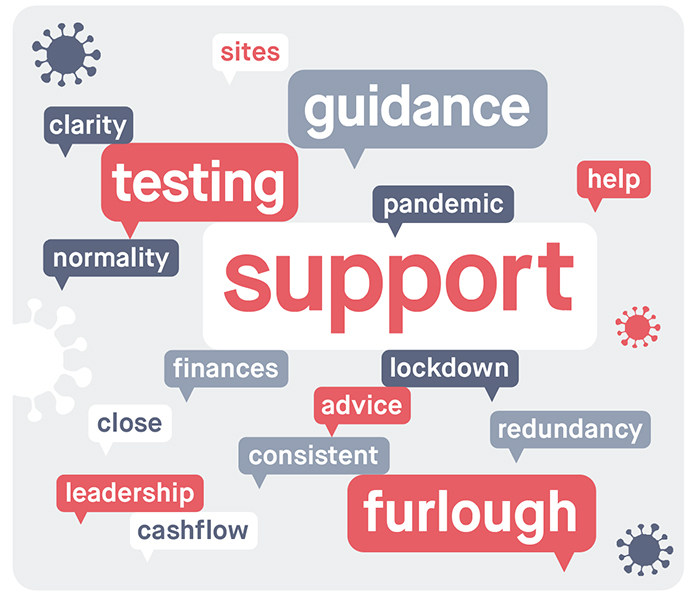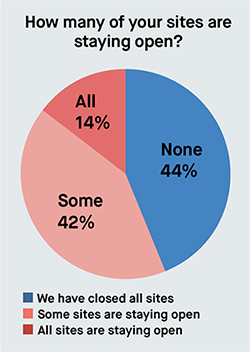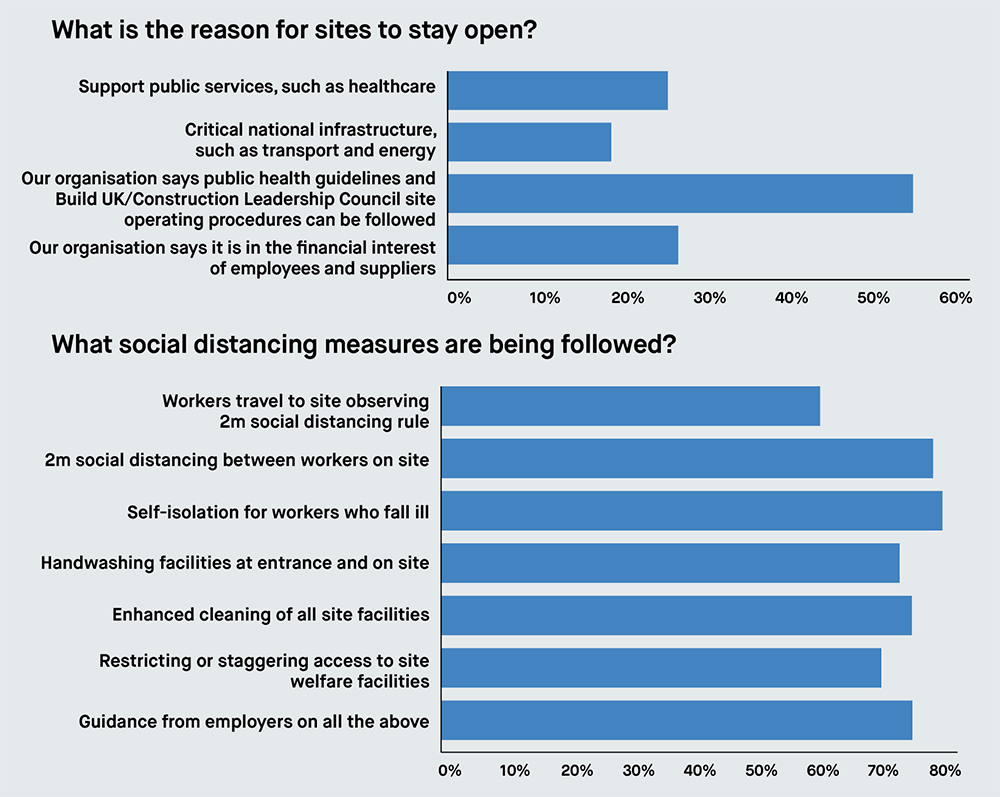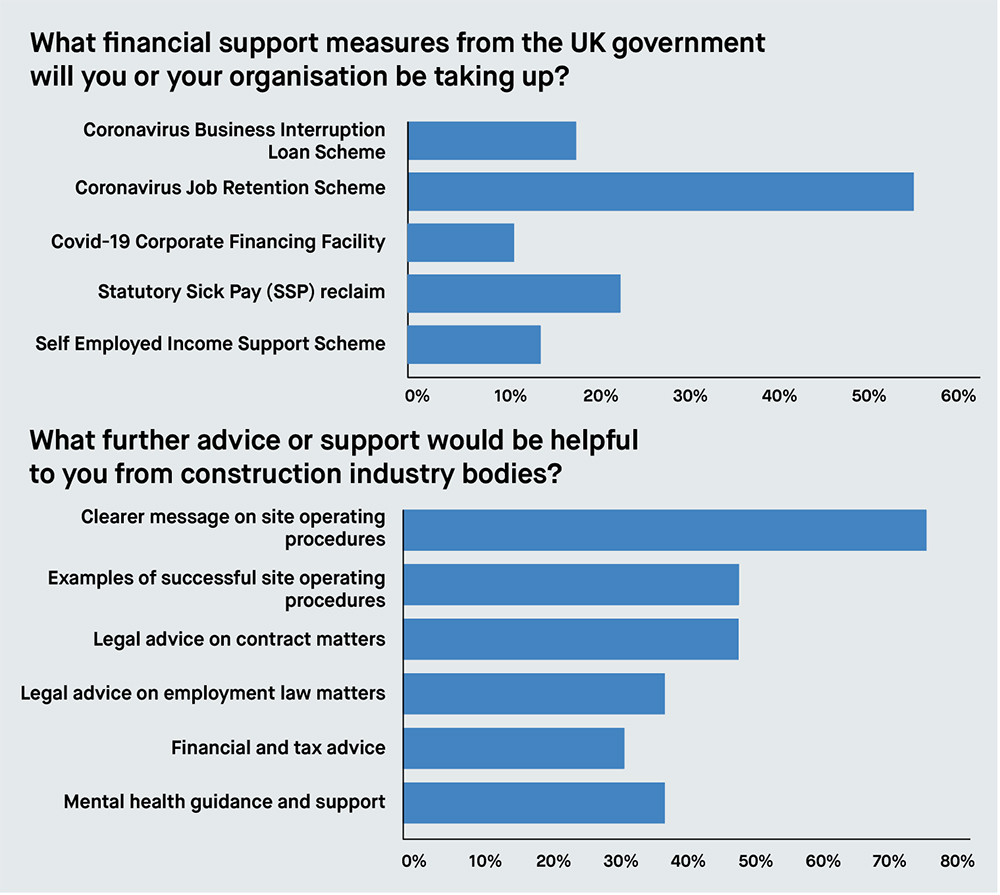
The word cloud shows the most common keywords which came up in the survey, sized according to their frequency
A majority of construction professionals say their organisations are trying to keep sites operational during the coronavirus lockdown, according to a comprehensive industry survey by CM and the CIOB. Neil Gerrard reports.
Most construction businesses believe they can follow coronavirus health guidelines and still keep sites open but face a challenge to convince workers that they are safe.
Those are the among the key findings of a survey by Construction Manager and the CIOB of 1,740 industry professionals, conducted shortly after the Covid-19 lockdown began.
More than half (56%) of those surveyed said their organisations were keeping all or some sites open. Of these, 57% said their organisations believed health guidelines and rules around social distancing could still be followed.
Asked in which sectors sites remained operational, half (50%) said that healthcare, education and other public building sites were still running, 28% of infrastructure sites and 19% of social housing sites.

Perhaps surprisingly, 31% said that private commercial sites and 26% that private housing sites remained operational. One respondent noted: “Most of the projects remaining open are not essential but driven by profit.”
On sites staying open, coronavirus protocols were largely being followed, according to the respondents.
Some 81% said the 2m social distancing rule was being observed by workers on site. Three-quarters said there were handwashing facilities at the entrance to the site and on the site itself, and 77% had observed enhanced cleaning of all site facilities.
Meanwhile, nearly three-quarters (72%) reported that measures have been put in place to restrict or stagger access to site welfare facilities. A total of 76% said employers had been issuing guidance on all of the health guidelines for safe site operation. And 81% said that ill workers were following self-isolation rules.
Travel challenges and a lack of clarity
But travelling to and from sites while still observing the 2m social distancing rule appears to be proving more problematic, with only 61% reporting that it was possible.
Construction employers face a challenge to convince workers that they are safe on site, with only 46% of respondents reporting that workers are happy to continue working.
And there were calls for clearer rules on what was and was not permitted for construction sites during lockdown.
One respondent said they were confused by government advice. They said: “There are mixed messages of: ‘Only travel if essential’ versus ‘Go to work if you cannot work from home’.”
Another added: “[We need] more clarity relating to suppliers and manufacturers. Within the guidance, it appears some form of normality can continue but at reduced rates and efficiency. Construction activity may be able to continue in some form, but without the critical supply chain such as precast then critical operations will bring a project to stop. This and the guidance must be reviewed regularly. If activity was considered to be a contributor to disease spread, it should stop.”

Asked what else government could do to support the construction industry, many called for a clear path forward set out by government to stop their organisations having to take even more drastic action.
One respondent said: “We need a better idea of how long the measures are going to take and what the actual plan is so we can move forward. The company I work for can cover a two-week break in play, if we know that we can start up shortly after.
“There must be some idea of the trajectory and impact of the outbreak that could be shared. If we are looking at more than two weeks, I do believe we will furlough staff and possibly even look to close down.”
Testing – of both industry workers and key workers – was identified by dozens of respondents as offering a potential route out of the lockdown. “[We need] more testing for Covid-19 so people who have antibodies can return to work and get the economy moving,” said one.
Financial worries
More than half of those surveyed are worried about managing their personal finances beyond the next three months, with some facing serious financial worries as a result of the lockdown.
The survey found that 47% were worried about managing beyond July, while 7.5% already had serious short-term concerns.

As a result of the closures, 38% of respondents reported staff being furloughed in their organisation, with 8% asked to take pay cuts and 7% seeing staff laid off. Another 42% reported staff being paid as normal, with 1% seeing staff being asked to have wages deferred and 3.5% witnessing staff being asked to take voluntary unpaid leave.
Perhaps surprisingly, 80% of respon-dents reported suppliers being paid as normal, with 4% saying suppliers were being asked to take reduced payments and 11.6% reporting suppliers being asked to take deferred payments. Another 4% said that suppliers have had contracts cancelled.
However, there were complaints about some firms’ behaviour during the lockdown. One specialist contractor said: “We have been disappointed with a number of main contractors enforcing contract law to try and get our workers on site who are currently on furlough. Other contractors who are willing to take risks and gain financial advantage by taking contracts off us is of real concern.”










